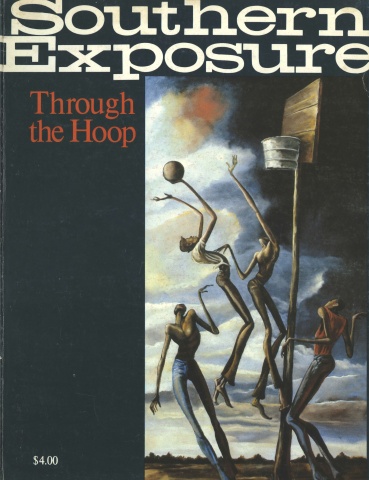NBC - The Greatest Team Ever

This article originally appeared in Southern Exposure Vol. 7 No. 3, "Through the Hoop." Find more from that issue here.
O.K., basketball fans . . . what amateur team has won more major national championships than any other? No . . . it’s not the UCLA men or the Wayland Baptist College women’s team, both holding 10 titles. It’s Nashville Business College, known in basketball circles as NBC. In its 20-year existence, the team from Nashville, Tennessee, won the AAU women’s championship 11 times, in 1950, ’58, ’60 and ’62-’69.
Herman O. Balls, president of Nashville Business College and a longtime sponsor of “Girls’ AAU Basketball,” organized the club in 1949. Players could attend his school and then continue on the team by taking a job with NBC or a related concern owned by Balls. Long-term stars included Alline Banks Sprouse, who also played for the Atlanta Blues; Joan Crawford of Van Buren, Arkansas, a 13-time All-American; Sue Gunter, a 1960 All-American from Walnut Grove, Mississippi, who will coach the U.S. women’s basketball team at the 1980 Moscow Olympics; and Nera White, a 15-time All-American from Lafayette, Tennessee, considered by many to be the greatest female player of all time. Gunter, who was also assistant coach in the 1976 Montreal Olympics, the first year the Games included women’s basketball, claims that Nera White “would definitely be a superstar today. She could do things on that court that I thought were impossible.”
The chance to play top-level ball was incentive enough to keep these athletes working under less than ideal circumstances. “We worked for NBC on the poverty plan,” says six-time All-American Doris Rogers, who now coaches at Nashville’s McGavock High. She points out that men playing for AAU teams got well-paid “executive” jobs from sponsoring companies like Phillips and Goodyear. Rogers remembers that when these men asked about women’s salaries, “we wouldn’t answer because we were ashamed to tell them.”
The coach of the team from 1949 onward was John Head, who compiled a career record of 689 wins and only 85 losses. At a time when most people were completely unaware of women’s basketball, Head led American players to success in international competition. He coached a U.S. team, with five Nashville women, to the world championship in Rio de Janeiro in 1957, edging the Soviet Union in the finals, 51-48, before 40,000 spectators. (The Brazilian government even issued a stamp that year with a woman basketball player on it.) “As far as I’m concerned,” says Gunter, who now coaches at Stephen F. Austin State University in Texas, “John Head was a genius. Half of what I use now, I learned from him.”
With Mrs. Head serving as the official chaperone, the NBC team traveled widely. In 1962 they journeyed to Madison Square Garden to play the powerful Soviet national team and then returned to play them in Nashville, losing both times. But in 1964 NBC defeated the Mexican national team in two games in Mexico City. NBC provided half the players and the coach for the U.S. team which toured the Soviet Union, winning four of six games, in 1958. (“I was leery,” Coach Head recalls of the cold war visit. “I thought we’d have to climb over an Iron Curtain to get in.”) And in 1965 Nashville formed the nucleus of a team that toured France, Germany and the USSR. As an NBC recruiting brochure put it, “The educational value of travel becomes a reality to club members.”
In the late 1960s, even though his NBC club had been successful playing international rules, sponsor Balls remained totally opposed to the AAU’s change to the five-player, full-court game. After announcing the end of the team in 1969, he said, “There are several things that entered into my decision. However, it is well known that my team will never play men’s rules. I think it is fundamentally wrong, and if persisted in, will eventually destroy girls’ basketball.”
Herman Balls died at the age of 93 in 1977, the same year a lawsuit was filed against the Tennessee High School Athletic Association for its continuation of the half-court rules in girls’ basketball. Those suing argued that use of the old rules discriminated against a player trying to get a college scholarship. The case was lost in court, but Tennessee coaches have recently voted to change to the new rules.
The rise of the collegiate sport since 1972 has brought new attention to women’s basketball, but some of the old-timers have mixed feelings about the shift. Nera White points out that women players, like men, don’t peak until well after their college years, but with so little top-flight post-graduate amateur or professional competition, women’s college basketball remains something of a dead-end street for the best performers. It wasn’t that way when NBC dominated the hardwood.
Tags
Elva Bishop
Elva Bishop is an alumna of Camp PLA-MOR and competes today in the Carrboro, NC, basketball and softball city leagues. She is finishing a masters in Physical Education at the University of North Carolina. (1979)